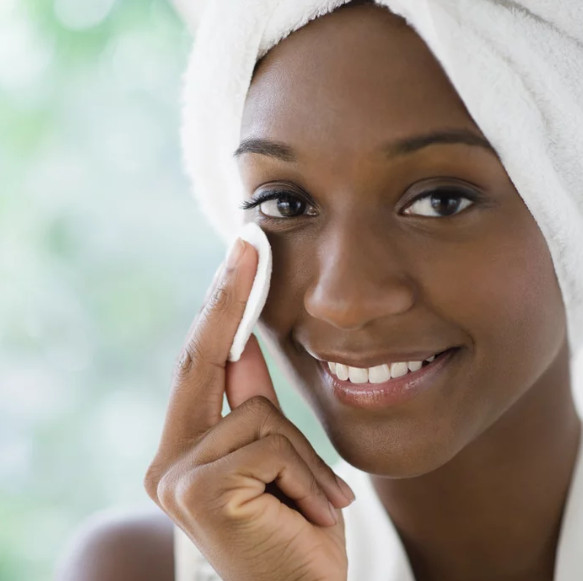Acne vulgaris known as acne is a skin condition which results from blockage of hair follicles with oil and dead skin cells. Blocked hair follicles create a thriving environment for Propionibacterium acne (P. acne) which can be found in pores causing inflammation on the skin. The face, shoulders, neck, back, upper arms, and buttocks are most affected parts of the body.
Acne lesions on the skin are categorized into non-inflammatory acne and inflammatory acne.
Non-Inflammatory
- Microcomedones: lesions which unblock and heal on their own.
- Blackheads: occur from the oxidation of sebum of a pore causing a brown or black appearance on the skin.
- Whiteheads:results from entrapment of sebum and bacteria underneath the skin’s surface.
Inflammatory
- Papules:occur when the hair follicle wall breaks, and white blood cells enter the pores.
- Pustules/Zits/Pimples: formed when white blood cells in a broken hair follicle walls rise to the skin’s surface.
- Cysts: large pus-filled lesions which occur when a pustule or papule collapses.
- Nodules: Redness caused by the total collapse of the blocked hair follicle wall.
Causes of Acne
Hormones: Androgen produced during puberty causes the sebaceous glands under the skin to grow and create more sebum. Excessive oil breaks down the walls of the hair follicles causing acne.
Genetics: acne can be hereditary because genetical makeup affects the body’s response to inflammation and cellular turnover rate.
Pressure: Acne can be aggravated by stress from suspenders, collars, helmets, and chin straps.
Medications: Some drugs containing iodides, bromides, or steroids worsens acne.
Occupations: Jobs were workers are exposed to certain industrial products like cutting oils may produce acne.
Cosmetics: Oil-based cosmetics/skin care products clog the pores causing acne or worsening already present conditions.
Prevention and management tips for Acne
- Washing of the face twice daily with warm water and mild soap removes dead skin cells, impurities, and extra oil from your skin’s surface which may cause acne.
- Avoid scrubbing the skin harshly or bursting pimples because it may push the infection which has blocked the pore her down, causing swelling, and redness.
- Avoid touching the face as much as possible because bacteria can spread from the hand to the pores or irritate already inflamed parts of the skin.
- People who have acne or are prone to the condition should use makeup sparingly and avoid oil-based products.
- Hair should be kept clean as it collects skin residue and sebum. Also, greasy hair products can get to the face and contribute to clogging in the skin.
- Anxiety and stress should be avoided as they increase the production of adrenaline and cortisol which worsens acne.
- Greasy food and junk food should be replaced with more fresh fruits and vegetables and whole grains to manage acne conditions.
Treatment for Acne
Acne treatment depends on how severe and persistent the condition is.
Conventional Treatments for Mild acne
There are over-the-counter treatment and prescription drugs which kills bacteria and reduce sebum production.
- Salicylic Acid is used to correct abnormal skin shedding to prevent clogging of pores.
- Benzoyl Peroxide which is in washes, gels, lotions, and creams kills the bacteria associated with acne.
- Retinoids are used for moderate and severe acne. It unclogs the pores and prevents dead cells from further clogging.
Systemic Treatments
Medications taken as pills to work in the body to treat acne.
- Corticosteroid injection is taken to reduce inflammation and speed up healing.
- Oral antibiotics like doxycycline, tetracycline, and amoxicillin are prescribed for moderate to severe acne to lower the population of Acnes.
- Topical antimicrobials like clindamycin and sodium sulfacetamide also reduce acnein patients.
- Oral contraceptives can be prescribed to help control long-term acne in women by suppressing the overactive gland.
- Isotretinoin is used for severe acne conditions which have been irresponsive to other treatments.
Procedures
In-office procedures available or acne treatment are:
- Lasers/Light Therapies.
- Chemical Peels.
- Acne Removal (drainage and extraction).
Acne is a skin condition that affects about 90% of the world population at some point in their lifetime. It is important to be informed of the causes and likely management and treatment options available to prevent scars which comes with the condition.
Need a Primary Care Physician? Primary Medical Care Center is an Urgent Care Miami provider serving Miami-Dade and Broward County with Two Convenient Locations. Call Now: 305-751-1500 or visit us (11500 NW 7th Ave., Miami, FL 33168, 2412 N State Road 7, Lauderdale Lakes, FL 33313).
